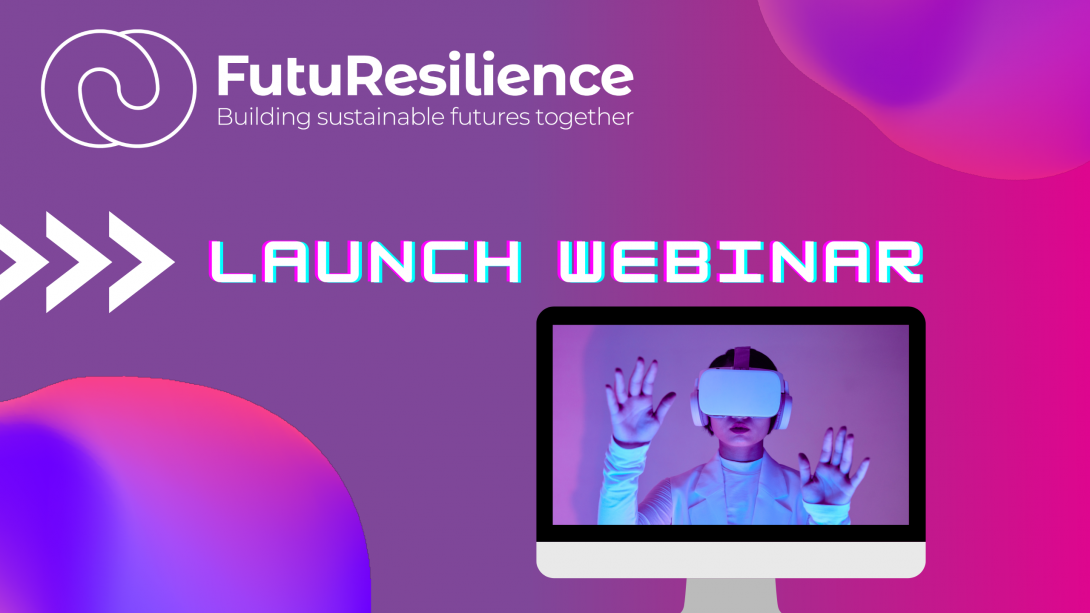FUTURESILIENCE Launch Webinar
28 March 2023

The FUTURESILIENCE Launch Webinar took place last 22nd March 2023. The event was the first opportunity to publicly present the project, how it will be implemented and discuss around a key question: how can research and innovation and foresight help fostering resilience?
Alasdair Reid, Executive Director of EFIS Centre and Matias Barberis, researcher at EFIS Centre and coordinator of the project, opened the webinar by introducing the FUTURESILIENCE project and presenting the consortium.
They pointed out that the FUTURESILIENCE project aims to strengthen European economic and social resilience through an enhanced ability to quickly respond to future crises.
This will be accomplished by facilitating the immediate and effective use of policy-relevant research and innovation (R&I) findings for actors at the national, regional and local levels through 10 pilot cases “Future Resilience Labs” working on multiple type of crises and challenges.
The webinar represented an opportunity to deeply explore the implications, possibilities and possible applications of R&I findings and anticipatory governance.
The role of R&I in fostering resilience
The first session was opened by Jörgen Sparf – researcher at NTNU Social Research – who offered an overview of current crises as part of human-being life and different approaches that could be implemented to manage these crises. He pointed out that modern society is a complex system that requires innovative and new strategic approaches to face disasters and crises. In this direction, resilience appears to be crucial, not only because it works in the long-term by posing the grassroots for long capacity to adapt and respond to the crisis, but also because it guarantees flexible tools and methods to face shocks.
Florian Roth – researcher at Zurich University of Applied Sciences – explained that resilience provides the right adaptation and transformation methods and strategies to both “bounce back and forward” after the shocks, thus the importance of investing to prepare for multiple types of crises. The role of R&I is fundamental throughout the development of local resources, in strengthening networks and relationships and in fostering anticipation of crisis and shocks.
In this direction, Michal Miedzinski from the Joint Research Centre of the European Commission highlighted that transformative innovation policies can foster sustainability transitions while strengthening Europe’s resilience to global crises. But as context matters, place-based policies need to consider localised innovation opportunities and specific territorial vulnerabilities to transition-related risks. Thus, there is a key role of the specific characteristics of local areas, local stakeholders, and indigenous knowledge as paramount elements to build coherent frameworks for innovative policies.
Anticipatory resilience
The second session on “anticipatory resilience” started by exploring the concept of “future as a public good”. Robin Bourgeois – from CIRAD –, explained that the future depends on how individuals perceive the future itself and future events. In other words, the future strictly refers to the concept of planning, but this activity implies a level of uncertainty, which will be considered as a resource, a strength to build resilience and to explore the possibilities and the way to cope and prepare for future events.
Projecting and envisioning the future means working on different horizons and with different participative actors (stakeholders). Dr Kerstin Cuhls – researcher at Fraunhofer ISI - has expressed this concept by highlighting the need to imagine distinctive and divergent futures and be prepared for them. The future is shaped by humans, and to achieve the desired future it is necessary to create a joint vision and common activities. Foresight and sense-making became, in this perspective, tools for achieving resilience, to discuss, interpret and assess knowledge about the future. More resources will be available, so more people can use them in case of crisis.
Foresight is also useful for policymakers; they could learn important information to make decisions and for being prepared for all possible future scenarios. Lieve Van Woensel - a foresight expert who previously worked in the Foresight Unit of the European Parliament – focused on the importance of the foresight approach to anticipate unintended consequences of policy or unexplored opportunities in the long term. Indeed, she expressed that Foresight can help policymakers make sure that policies are relevant to the entire society in the long run. It can make EU policies more future-proof.
Next steps
The webinar presented a vivid discussion on the central role of R&I and anticipatory resilience as tools for building resilient societies. It focused on the relevance of future preparedness for crisis and shocks through creative, adaptable and flexible solutions. During the first year of the project the consortium will focus on mapping relevant innovation policies to strengthen resilience and preparing the basis for the experimentation phase in which existing solutions will be tailored to specific contexts and tested in co-creation labs.
The consortium will launch an open call for seven additional pilot cases – funded through a cascade mechanism – that will take part of the experimentation phase of the project. They will join three pilots that are part of the consortium and working on topics such as climate change and urban regeneration (Murcia), migration and financial crisis (Chios Island) and challenges of the health system (BAPEMED). Thereby, the project will help shed light on the future risks that Europe may face and uncover vulnerabilities as part of the foresight work undertaken on the different cases.
Stay tuned for the official launch in June 2023 & follow us on social media to get all the project updates!
Login to add a new comment